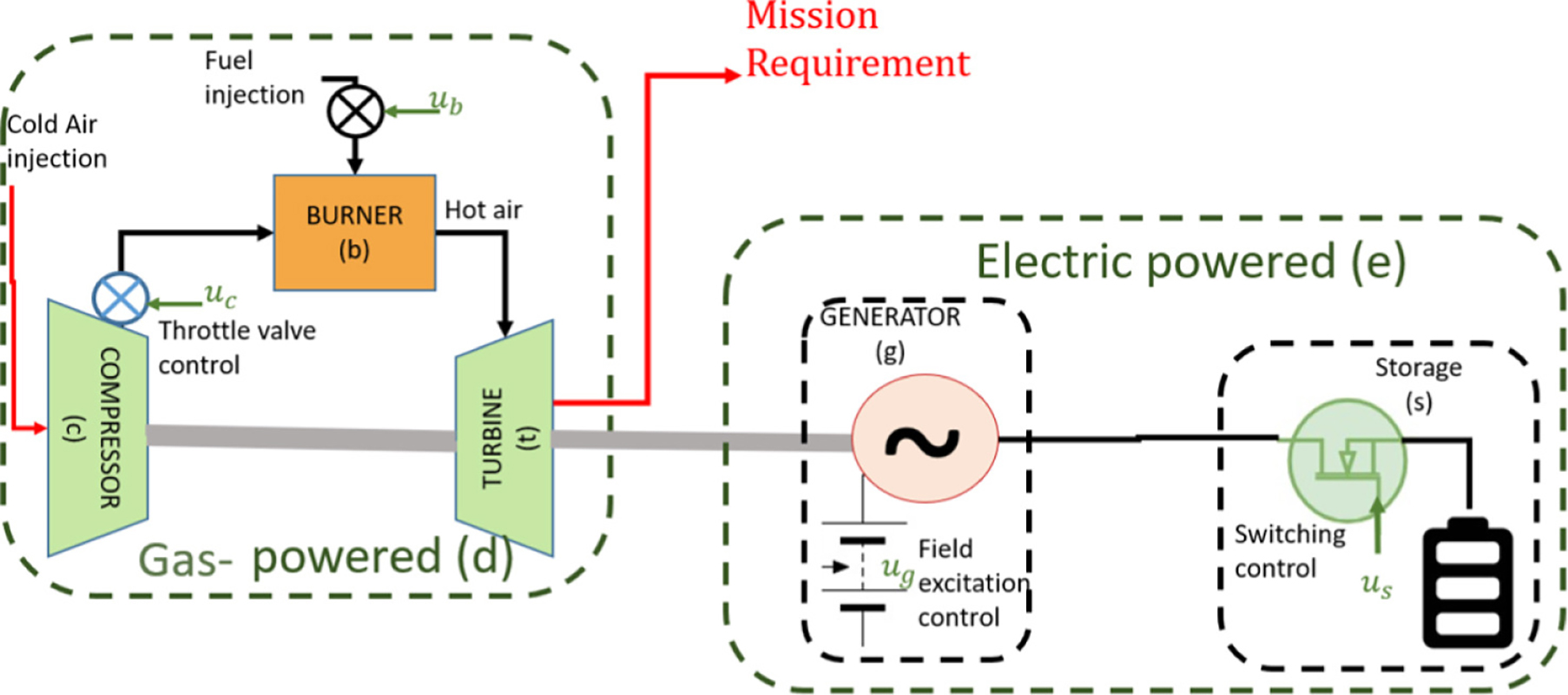
|
 |
Fig. 1 from the paper: Candidate Turbo-Electric Distributed Propulsion (TeDP) system architecture. The disturbances are shown with red arrows while the available actuators are shown with green arrows. |
|
New research by Rupamathi Jaddivada and Marija D.Ili? of MIT and ISR-affiliated Professor Eyad Abed (ECE) explores the potential of active control for end-to-end power trains of hybrid electric aircraft. Their research expands the operating envelope beyond compressor stall and surge limits, allowing a smaller engine to attain the same performance as a larger one.
The researchers for the first time describe the detailed mathematical modeling and control of energy dynamics in end-to-end hybrid power trains. Their proposed controller does not require much energy, opening the door to exploring the potential of small storage (battery) in Turbo-electric Distributed Propulsion (TeDP) systems. Preliminary results show that this cooperative control makes a case for hybrid aircraft relying on fast nonlinear control in the electric part of the power train.
The research, “Energy modeling and control for improved engine stability and efficiency in air vehicles,” was recently published in Annual Reviews in Control 52.
Future commercial aircraft may fly under challenging conditions that result in dynamic engine instabilities known as stall and surge. Military jet engines avoid such instabilities by oversizing the engine. But what if there were a different solution?
Dynamic instabilities are a result of bifurcations associated with the dynamical model of gas-powered engine compressors. The researchers adopt control co-design thinking and take a systems-oriented approach to identifying the prime physical causes of instabilities. Instead of oversizing the engine, they show that dynamic instabilities can be overcome through short-term power injections from batteries.
They propose a unified energy-based modeling framework using generalized reactive power, a quantity that provides a measure of inefficiencies associated with the rate of energy transfer within and between system components. They show this quantity plays an integral role in quantifying and controlling dynamic instabilities and propose systematic control co-design strategies to evaluate the trade-offs involved when controlling the generalized reactive power injected through pneumatic valves and electric actuation. Notably, the energy flows become bidirectional.
Their proposed multi-layered controller directly supports distributed cooperative exchanges of instantaneous reactive power within and across different parts of the power train, making the effects of active control on energy dynamics almost transparent.
The researchers conclude that, instead of oversizing the engine, available controllers can be better designed. Preliminary results show that this cooperative control makes a case for hybrid aircraft relying on fast nonlinear control in the electric part of the power train.
Related Articles:
Martins, Arcak and Park organize 'population games' workshop at the 62nd IEEE CDC
Oct. 13-14: Workshop on New Frontiers in Networked Dynamical Systems: Assured Learning, Communication & Control
Al-Obaid, Adomaitis publish renewable energy algorithm in Royal Society of Chemistry journal
Alumnus Udit Halder’s work published as cover article in Proceedings of The Royal Society A
Alum Shinkyu Park wins 2022 O. Hugo Schuck Award
New website showcases work of Clark School’s microelectronics researchers
New model predictive control framework improves reactive navigation for autonomous robots
Port-Hamiltonian modeling formalism framework proposed for swarms
Khaligh, McCluskey receive Boeing funding for more electric aircraft
Khaligh is co-PI on new Boeing contract
February 7, 2022
|

